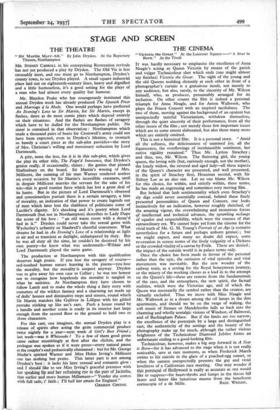STAGE AND SCREEN THE THEATRE
" Sir Martin Marr-A11." By John Dryden. At the Repertory Theatre, Northampton
MR. SYDNEY CARROLL in his enterprising Restoration revivals has not yet produced a play by Dryden. The Old Vic is less excusably inert, and one must go to Northampton, Dryden's county town, to see Dryden played. A small square industrial place laid out on eighteenth-century lines, heavy and dignified and a little humourless, it's a good setting for the plays of a man who had almost every quality but humour.
Mr. Blaydon Peake who has courageously instituted this annual Dryden week has already produced The Spanish Friar and Marriage d la Mode. One would perhaps have preferred An Evening's Love to Sir Martin, for Sir Martin, except in flashes, dates as do most comic plays which depend entirely on their situations. And the flashes are flashes of savagery which have to be dulled for the Northampton public. No sneer is contained in that observation : Northampton which made a thousand pairs of boots for Cromwell's army could not have been expected, even in Dryden's lifetime, to stomach so bawdy a court piece as the sub-plot provides—the story of Mrs. Christian's willing and mercenary seduction by Lord Dartmouth.
A pity, none the less, for it is in this sub-plot, which gives the play its other title, The Feign'd Innocence, that Dryden's genius really, if occasionally, shines : the genius that pinned Shaftesbury on the board. Sir Martin's wooing of Mrs. Millicent, the cunning of his man Warner rendered useless on every occasion by Sir Martin's incredible crassness, until in despair Millicent marries the servant for the sake of his wit—this is good routine farce which has lost a great, deal of its lustre. But in the picture of Lord Dartmouth's obsessed and conscienceless pursuit there is a certain savagery, a hint of morality, an indication of that power to create legends out of men which later lent the shabbiest of politicians some of Lucifer's dignity. It's shocking and it's poetry when Lord Dartmouth (but not in Northampton) describes to Lady Dupe the scene of his love : " an old waste room with a decay'd bed in it." Dryden could never take the sexual game with Wycherley's urbanity or Shadwell's cheerful coarseness. What dreams he had in An Evening's Love of a relationship as light as air and as transient as daylight, unhampered by duty. But he was all duty all the time, he couldn't be deceived by his own poetry—he knew what was underneath—Wildair and Lord Dartmouth played the same game.
The production at Northampton with this qualification deserves high praise. If you lose the savagery of course- red-toothed human nature hunting in the piazza—you lose the morality, but the morality is suspect anyway. Dryden was to give away his own case to Collier ; he was too honest not to recognise how hopelessly the moralist is tangled in what he satirizes. At Northampton they have chosen to follow Lamb and to make the whole thing a fairy story with costumes of the wildest fantasy and a charming set made up of dolls' houses and diminutive steps and streets, round which Sir Martin wanders like Gulliver in Lilliput with his gilded perruke sticking up like ass's ears. Push a house round by a handle and another scene is ready in its interior just large enough from the second floor to the ground to hold two or three characters.
For this cast, one imagines, the annual Dryden play is a release of spirits after acting the grim commercial product twice nightly for a year—next week A Girl's Best Friend ; last week—was it Whiteoaks ? To a few of them good prose came rather stumblingly at first after the clichés, and the prologue was spoken as if it were prose—every natural pause at the couplet's end pedantically eliminated : but for Mr. George Mudie's spirited Warner and Miss Helen Irving's Millicent one has nothing but praise. This latter part is not among Dryden's best : it lacks his later sensual and romantic glow : and I should like to see Miss Irving's graceful presence with her speaking lip and her refraining eye in the part of Jacintha, that earlier and more human Millamant—" Yonder she comes with full sails, i' faith ; I'll hail her amain for England."
GRAHAM GREENE.


















































 Previous page
Previous page